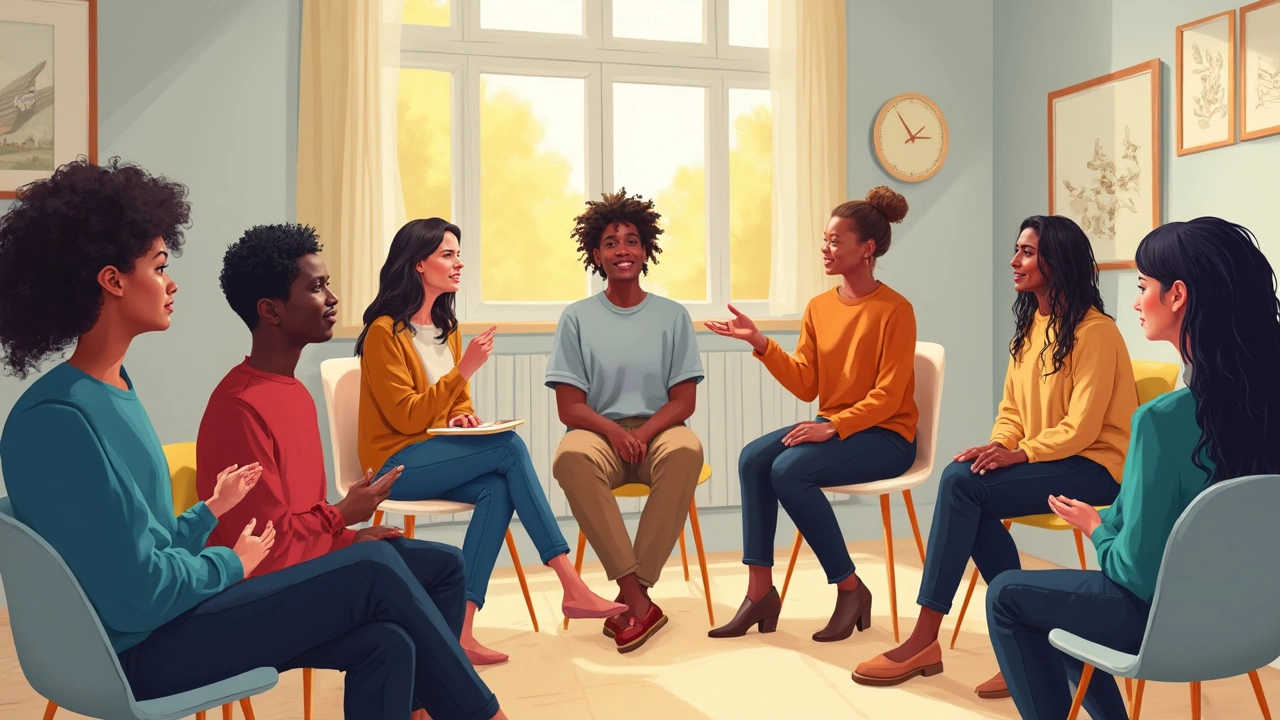Think you know everything about sex because you’ve been at it for years? You’d be surprised. Most adults still carry myths and weird hang-ups from whatever version of sex education they got in school. It’s no secret: sex advice was either skipped, laughed off, or made so awkward you might’ve wiped the whole class from memory. Fast-forward to now, and the world’s noisier, bolder, and way more complicated when it comes to sex. The catch? If you stop learning, your sex life stops growing. People talk about self-improvement with diets and gyms, but sex? That’s still whispered, or not spoken about at all. That’s a shame, because the more you know about sex as an adult, the better your relationships, confidence, and pleasure can be. Let’s get into why and how you can stay informed—no apologies or giggles required.
Why Adult Sex Education Should Never Stop
Sex evolves, and so do we. What worked at 25 can feel like a puzzle at 45. Bodies change—thanks to stress, hormones, babies, breakups, or just the unglamorous march of time. Life throws surprise curveballs: sudden dryness, new aches, weird feelings, unexpected desires. Keeping up with real, current info helps you handle these shifts without freaking out or pretending everything’s fine.
Here’s a surprising stat: a 2021 report from the Kinsey Institute found only 30% of adults felt “very informed” about sexuality beyond the basics. That’s wild, right? What’s more, when adults searched for new info—from podcasts to online courses—most described a boost in confidence and communication. Talking about sex isn’t just about feeling good; it leads to people getting the healthcare they need, getting out of unhealthy patterns, and actually having fun in bed, not just going through the motions.
But why don’t adults learn more? Embarrassment ranks high, but there’s also the myth that grown-ups are supposed to know it all. That pressure creates shame, and shame kills curiosity. But adults who seek out accurate info—through quality websites, trusted therapists, or even conversations with sex workers or resources like London escorts—find themselves less anxious and more adventurous. Real sexual confidence comes from knowledge, not just experience or bravado.
So, what areas does adult sex ed really cover? Not just positions or toys, but pleasure, anatomy, consent, sexual health, communication, and keeping passion alive over time. It tackles deep stuff, like body image, trauma, or keeping long-term intimacy from feeling stale. Imagine understanding why hormone shifts might zap your libido, or how to talk about fantasies without sounding like a weirdo. Those are real-life adult skills.
Want a better relationship? Couples who actually talk about what they like and don’t like end up more satisfied, argue less, and are less likely to cheat. And it’s not just partners—even solo learning makes masturbation less routine and more rewarding. Self-discovery doesn’t have a finish line.
The Science Behind Continuing Sexual Learning
Brains crave novelty—it’s not just a cheesy slogan. Dopamine, the so-called “pleasure chemical,” spikes when you try something new. This is true for food, travel, and yes, sex. If things get repetitive, the brain zones out. Adult sex education feeds that curiosity, which is why people who keep learning about sex often keep wanting sex, too.
MRI research from 2022 at the University of Geneva actually mapped how talking about sex, reading erotica, or learning new pleasure techniques lights up reward and memory centers in the adult brain. When adults watch educational videos or read up on anatomy and technique, their brains fire up the same way as when they try new foods or learn a language. The effect? More energy, more attention, better memory, and an increase in sexual satisfaction. It’s all connected.
Learning more about sex also helps adults spot changes that need medical attention—like sexual pain, STIs, or symptoms that aren’t “just normal aging.” One study published in The Journal of Sexual Medicine found that adults who updated their sexual knowledge were twice as likely to get screened for STIs compared to those who didn’t. Catching a health problem early can make all the difference. On the flip side, skipping info out of embarrassment has real risks, from untreated infections to declining relationships.
Here’s a table showing just how knowledge shapes real outcomes:
| Area of Sex Education | Adults Keeping Informed | Less Informed Adults |
|---|---|---|
| Communication About Sex | 73% report high satisfaction | 32% report high satisfaction |
| STI Prevention | Regular screening & safety | Occasional or rare screening |
| Handling Changes (e.g., Menopause) | Prepared and adaptable | Stressed, confused |
| Consent & Boundaries | Comfortable discussing needs | Feel awkward or avoidant |
When people learn together, the benefits double. Therapists see couples who join workshops or even just laugh about new sex tips at dinner reconnect in a big way. Knowledge, it turns out, really is sexy.

Busting Persistent Myths and Misinformation
Let’s be honest: most adults still run into sex myths nearly every week. The Internet’s great for cat videos but questionable when it comes to accurate sex advice. Persistent myths (“you’ll lose interest over time,” “bigger is always better,” “if you love each other, passion’s automatic”) pop up in movies, ads, or late-night conversations. Unfortunately, letting those lies settle can ruin confidence and kill curiosity.
Maybe you’ve heard someone say, “Sex drive just dies after 50.” Wrong. Many adults report their most satisfying sex in their 50s, 60s, and beyond—as long as they adapt, communicate, and let curiosity guide them. Or how about the “rule” that if you need to look up sex tips, your relationship is in trouble? Actually, couples who learn together bond together. Sex educators love to share that even decades into marriage, there’s always something new to learn.
Then there are the medical myths: “Pain is normal,” “Men always want sex,” “Lubricants are only for older people.” These hurt everybody. Learning the truth—like how common menopause-related changes really are, or why lube is for everyone—can mean the difference between awkward sex and great sex. You want tools and strategies, not outdated ideas.
For a lot of adults, stigma comes from purity culture, pop culture, or flat-out bad info passed down through families. Breaking free means seeking out quality resources: books by actual sex therapists, podcasts run by experts, or respectful, informed voices. Some turn to real-world experiences, like talking honestly with sex workers, who often know more about consent, communication, and sexual fulfillment than most mainstream books.
If something feels off, boring, or painful, you’re not broken—you just need better info. And better info’s out there once you start looking.
Practical Ways to Keep Learning and Growing
So, how do you keep your sex education alive? Turns out, it can be easy and fun to fit grown-up sex learning into real life. Here are some concrete tips:
- Ask your partner(s) or friends what they wish they’d learned sooner. Real talk beats Google any day.
- Check out newsletters, podcasts, or blogs by certified sex therapists or savvy educators—like “Sex With Emily” or “Come As You Are.”
- Don’t be afraid to take online classes or workshops—they’re private, often funny, and way less awkward than most people expect.
- Consider reading erotica or instructional books together. Laughing or blushing is part of the experience.
- Get proactive about annual checkups and bring up sexual health with your doctor.
- Try a session with a sex coach or even talk honestly with experienced London escorts who know the ropes.
- Mix up routines: new positions, new locations, or just new conversations about what you enjoy or want to try.
- Learn about sexual wellness products—lube, toys, or massage oils—without feeling silly or embarrassed. Quality matters!
- Address body image and communication directly—nobody’s perfect, so focus on authentic connection.
Remember, it’s less about “fixing” what’s broken and more about adding depth and variety. The happiest adults treat sex like lifelong learning, not homework. They grow less judgmental and more creative, adventurous, and honest.

Benefits You’ll See When You Keep Learning About Sex
People who keep learning about sex aren’t just having more fun—they’re healthier and happier. Stronger intimacy, better confidence, less performance anxiety. Health experts from the World Health Organization say regular, pleasurable sex is linked to better sleep, lower stress, and even a stronger immune system. Adults who update their information show lower rates of infidelity and higher rates of relationship satisfaction, mostly because they can talk openly and solve issues sooner.
Learning also opens the door to pleasure and safety for everyone, no matter their background, age, or body shape. Maybe you find out pain during sex isn’t something to “push through,” but a problem that can be fixed. Or maybe you find new turn-ons you never expected. Either way, adults who see sex as a skill—one that needs practice, learning, and revision—get more out of it.
The science and stories both say the same thing: keeping your sex knowledge fresh helps you build trust, communicate desires, and try new things without shame. You’ll feel more confident in your skin and become a better partner—maybe even a better friend or parent, since open talk about sex leads to healthier attitudes in the next generation too.
There’s honesty and joy in admitting you don’t know it all. The “best” lovers aren’t the ones who start off with all the moves—they’re the ones who stay curious, adaptable, and unafraid to learn.
